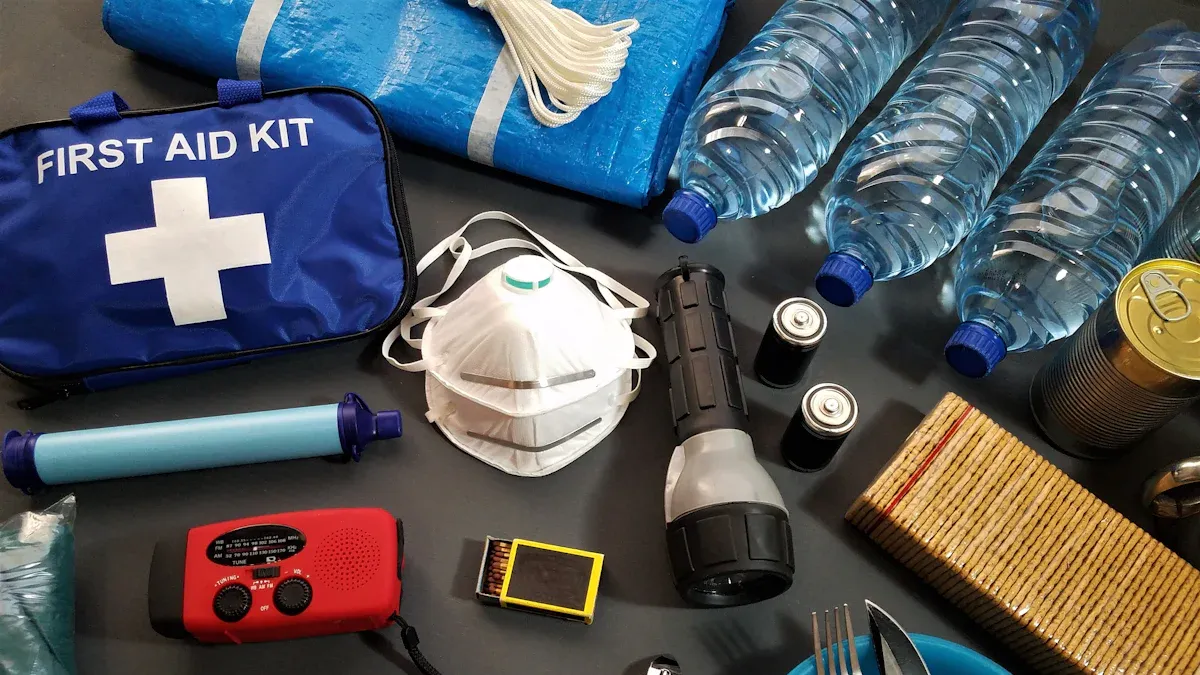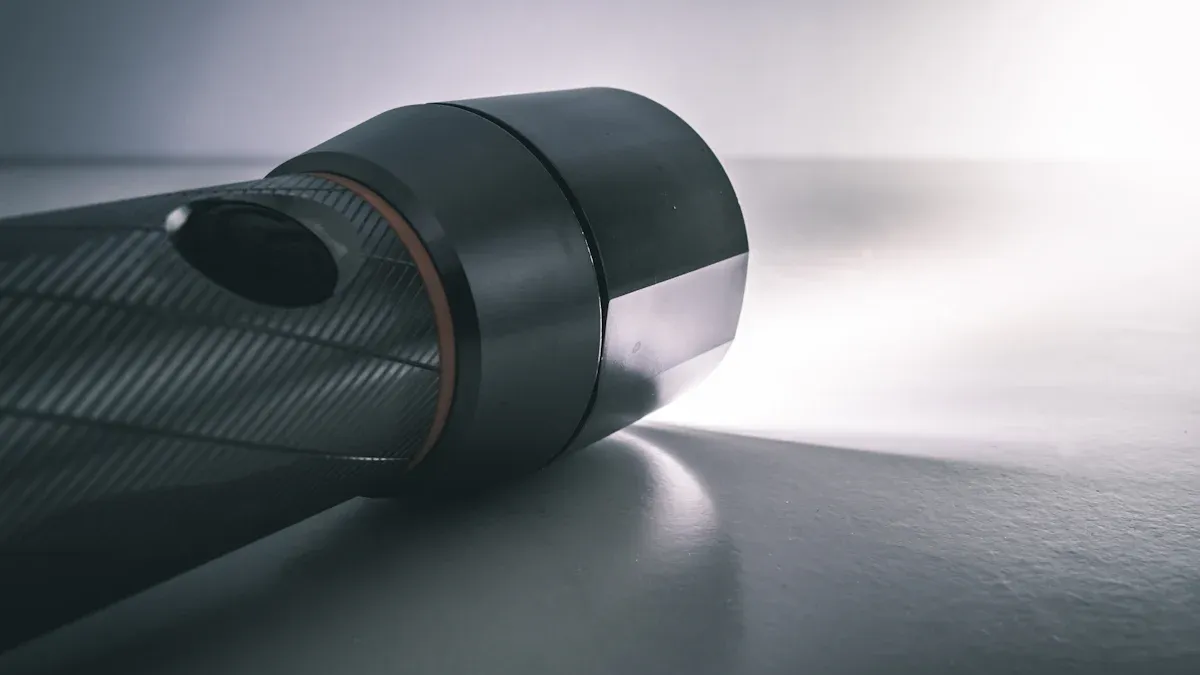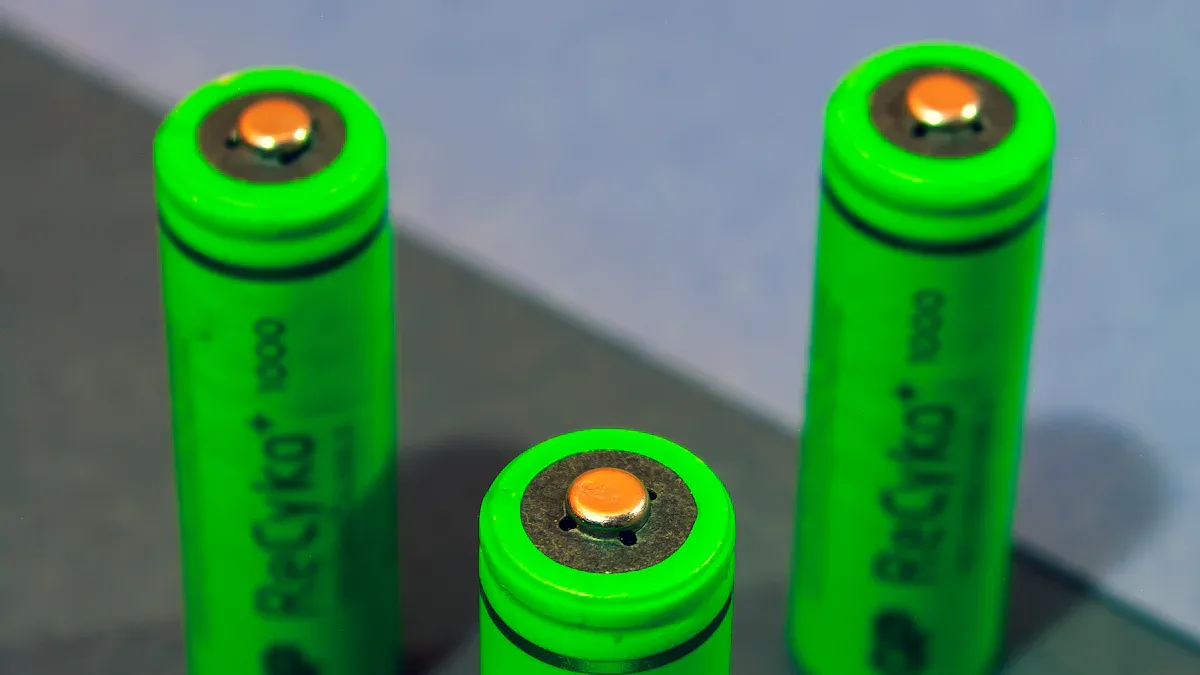Why You Should Keep Extra Batteries on Hand for Your Helius Flashlight

Imagine grabbing your Helius flashlight during a power outage, only to find it dead. Frustrating, right? Batteries are the lifeline of your flashlight, keeping it ready when you need it most. Emergencies don’t wait, so having extra batteries ensures you’re never left in the dark. Stay prepared—it’s that simple.
Key Takeaways
Always have spare batteries for your Helius flashlight. This helps it work during emergencies and keeps you safe.
Keep batteries in a cool, dry spot to make them last longer. Use safe containers and check their power often.
Look at battery expiration dates and use older ones first. This way, you’ll always have working batteries when needed.
The Role of Batteries in Your Helius Flashlight
How Batteries Ensure Flashlight Functionality
Batteries are the powerhouse of your Helius flashlight. Without them, your flashlight is just a hollow shell. The type of battery you choose directly impacts its performance. For example:
Lithium batteries offer long runtimes and work well in extreme temperatures, making them perfect for outdoor adventures or emergencies.
NiMH batteries are rechargeable and eco-friendly, ideal for frequent use.
Li-ion batteries are lightweight and provide consistent power, ensuring your flashlight stays bright when you need it most.
The right battery ensures your flashlight operates at its best. Higher-capacity batteries, measured in milliampere-hours (mAh), allow for longer usage. Matching the voltage to your flashlight’s requirements is also critical. Using the wrong voltage can damage your flashlight or reduce its brightness.
Why Reliability Matters in Emergencies
Imagine being in a blackout or stranded on a dark road. In these moments, your flashlight becomes your lifeline. Reliable batteries ensure your flashlight works when you need it most. Batteries with a long shelf life, like lithium ones, are especially useful for emergencies. They stay ready even after months of storage. A dependable battery provides stable power, giving you peace of mind during critical situations.
Everyday Scenarios Where a Dead Flashlight Can Be a Problem
A dead flashlight can turn simple tasks into frustrating challenges. Picture this: you’re searching for something in a dark attic, and your flashlight dies. Or you’re camping, and the light goes out just as you’re setting up your tent. These situations highlight the importance of batteries. Keeping your flashlight powered ensures you’re always prepared, whether it’s for fixing a blown fuse or navigating a dark trail.
Risks of Not Having Spare Batteries

Consequences During Power Outages
Power outages can strike without warning, leaving you in complete darkness. Without spare batteries, your flashlight becomes useless when you need it most. Imagine trying to navigate your home during a blackout or searching for candles in the dark. It’s frustrating and even dangerous. Batteries can lose their charge over time, especially if they’re not checked regularly. Dust and dirt can also affect performance, making your flashlight unreliable. Keeping extra batteries ensures you’re prepared for these moments, avoiding unnecessary stress and inconvenience.
Safety Concerns When Stranded Without Light
Being stranded without light can be a scary experience. Whether you’re stuck on a roadside at night or hiking in the wilderness, a dead flashlight puts you at risk. Extreme temperatures can degrade batteries, causing them to fail when you need them most. Faulty wiring or improper installation can also lead to sudden failure. These issues highlight the importance of having spare batteries on hand. A reliable flashlight can guide you to safety, but only if it’s powered and ready to use.
How Battery Failure Can Compromise Emergency Preparedness
Emergency preparedness relies on having functional tools, and your flashlight is no exception. A failed battery can compromise your ability to respond to critical situations. Older batteries may lose capacity, while environmental factors like humidity can cause corrosion. Neglecting to maintain your flashlight or store batteries properly can lead to failure. By keeping spare batteries and checking them regularly, you can avoid the potential dangers of leaving batteries unchecked. This simple step ensures you’re always ready for the unexpected.
Benefits of Keeping Extra Batteries

Convenience and Readiness
Keeping extra batteries on hand saves you from unnecessary stress. Imagine needing your flashlight during a sudden power outage or while camping, only to find the batteries are dead. Having spares ensures you're always ready. You won’t have to scramble to find replacements or risk being left in the dark.
Storing batteries properly can also make them last longer. Keep them in a cool, dry place, away from direct sunlight or extreme temperatures. Use a battery case or their original packaging to prevent contact with metal objects. This simple habit keeps your batteries in good condition and ready to use when you need them most.
Enhanced Safety in Critical Situations
Extra batteries can be lifesavers in emergencies. Whether you're navigating a dark trail or dealing with a blackout, a working flashlight is essential. A rechargeable lithium-ion battery is a great option for emergencies. It provides consistent power and can be recharged multiple times, ensuring your flashlight stays operational.
By keeping spare batteries, you reduce the risk of being caught unprepared. You’ll have peace of mind knowing your flashlight will work when it matters most. This small step can make a big difference in keeping you and your loved ones safe.
Prolonging the Life of Your Helius Flashlight
Proper battery management not only keeps your flashlight ready but also extends its lifespan. Avoid mixing old and new batteries or different types in the same device. This can cause uneven power distribution and damage your flashlight.
Rechargeable batteries, like lithium-ion ones, are especially beneficial. Use chargers that automatically shut off when the battery is full to prevent overcharging. Recharge lithium-ion batteries before they’re completely drained to maintain their efficiency. Removing batteries from unused devices also prevents leakage, which can harm your flashlight.
Taking care of your batteries ensures your Helius flashlight stays reliable for years to come. It’s a simple way to protect your investment and get the most out of your gear.
Practical Tips for Managing and Storing Batteries
Best Practices for Battery Storage
Storing batteries the right way ensures they stay functional when you need them. Here’s how you can do it:
Keep them in a cool, dry place, away from direct sunlight or extreme temperatures.
Store each battery separately in non-conductive containers to avoid short circuits.
Make sure batteries are at about 40-50% charge before storing them for long periods.
Label each battery with its type and purchase date for easy identification.
Recharge stored batteries every six months to maintain their efficiency.
By following these steps, you can avoid the potential dangers of leaving batteries improperly stored, like swelling or damage.
Checking Expiration Dates and Rotating Stock
Batteries don’t last forever, so keeping track of their expiration dates is crucial. Use the oldest batteries first to ensure none go to waste. Regularly check your stock and replace expired ones. This habit not only saves you money but also ensures your flashlight always has reliable power.
Tip: Rechargeable lithium-ion batteries are a great option for frequent use. They last longer and can be recharged multiple times, reducing waste and saving you trips to the store.
Preventing Corrosion and Leakage
Corroded or leaking batteries can damage your devices and create a mess. To prevent this:
Remove batteries from devices you’re not using for a while.
Avoid mixing different brands or battery types in the same device.
Store batteries in a stable temperature environment, ideally between 50 and 77°F.
Regularly inspect batteries for signs of damage or leakage.
Manufacturers recommend removing batteries from unused devices to prevent leaks. This simple step can save your flashlight from unnecessary damage.
Taking these precautions keeps your batteries safe and ready to use, ensuring your flashlight stays reliable in any situation.
Keeping extra batteries for your Helius flashlight is a smart move. You’ll always be ready for emergencies or unexpected situations. Spare batteries mean no unnecessary risks and more peace of mind. Start today—stock up on batteries and store them properly. Your flashlight will thank you when you need it most! 🔦
FAQ
How many spare batteries should you keep for your Helius flashlight?
It’s smart to keep at least two sets of spare batteries. This ensures you’ll always have a backup during emergencies or extended use.
Can you mix different battery brands in your flashlight?
No, mixing brands can cause uneven power distribution. Stick to one brand and type for optimal performance and to avoid damaging your flashlight.
What’s the best way to dispose of old batteries?
Recycle them at a local battery recycling center. Many stores and community programs accept used batteries to prevent environmental harm. ♻️
Tip: Check your flashlight’s manual for recommended battery types to maximize its lifespan and performance.
See Also
Top Reasons to Select Helius for Everyday Carry Flashlights
Explore Your Journey with the Helius Tactical Flashlight
Essential Helius T1-B COB Flashlight for Every Situation
